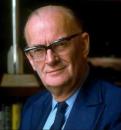'Known as one of the modern masters of science fiction', English novelist Arthur C. Clarke has been recognised as 'the architect of some of the 20th Century's most enduring mythology. A futurist and science fiction writer, Clarke...penned more than 600 articles and short stories, as well as dozens of novels and collections. His work has been translated into over 30 languages and adapted on television and in Hollywood movies, most notably in the classic' 1968 Stanley Kubrick film,
2001: A Space Odyssey. The movie attracted a 'new audience' for Clarke's 'visionary tales about the possibilities of science and the wonders of space exploration, and solidified his reputation as one of the modern masters of science fiction.'
A 'man of many interests', in 1954 Clarke 'took the first step in what would become a lifelong effort to explore and photograph the Great Barrier Reef of Australia and the coast of Sri Lanka. He took up residence in Sri Lanka (known at the time as Ceylon) in 1956. An avid skin diver, Clarke wrote many non-fiction books and articles about his experiences.' His work subsequently 'came to embrace many topics that went beyond the conventions of genre science fiction.
The Deep Range (1954) concerned the possibility of farming under the sea in the future, managing to combine Clarke's interests in science and underwater exploration.'
In December 1954,
The West Australian newspaper reported that Clarke 'was visiting Australia to secure scientific information at the other extreme from outer space. He had brought five underwater motion picture and still picture cameras to photograph in colour the marine life of the Barrier Reef.'
(Source:
Encyclopedia of World Biography, 1998;
The West Australian 16 December 1954, p.11)


